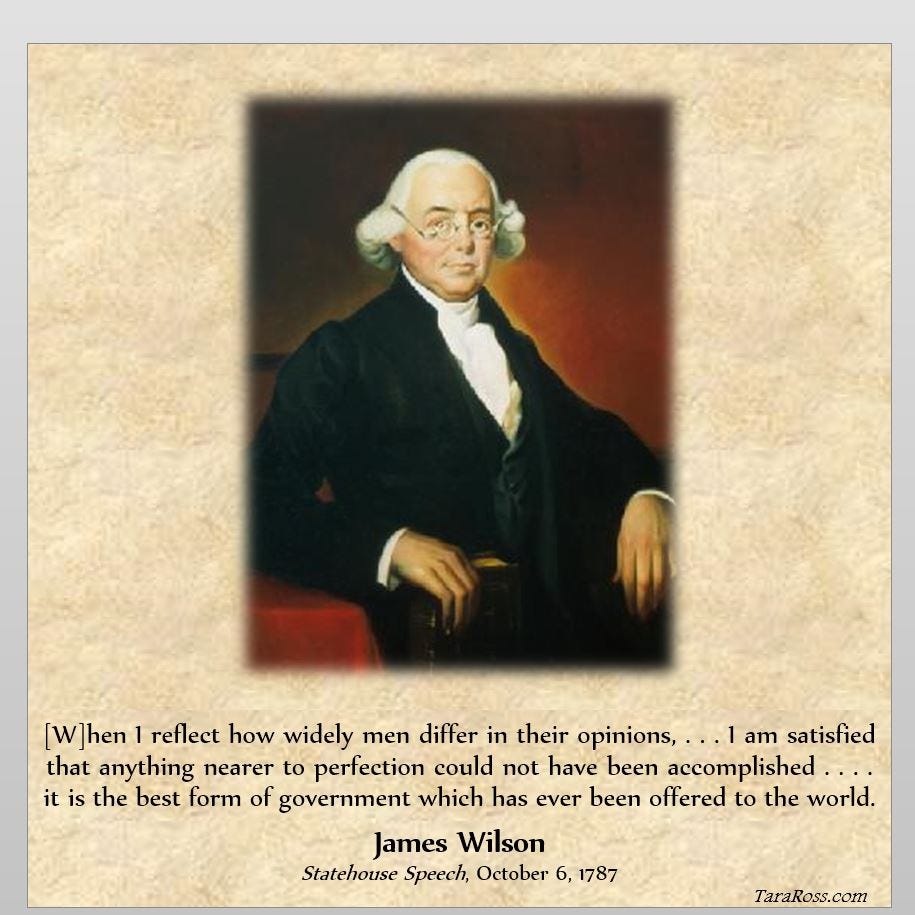TDIH: James Wilson's State House Speech
Public opinion began to turn on the “intemperate & violent Measures” of the pro-Constitution majority. Wilson’s impromptu October 6 speech helped save the day.
On this day in 1787, a delegate to the Constitutional Convention addresses a large crowd at the State House in Philadelphia. As James Wilson spoke, his home state of Pennsylvania was in turmoil.
The Constitutional Convention had just ended, and that document was now being considered by the states. All eyes were on Pennsylvania, which had played such a vital role in the American Revolution. Would it now ratify or reject the proposed new form of government? Pennsylvania’s decision would carry great influence.
Making matters worse, a political firestorm was brewing after recent events in the Pennsylvania Assembly.
Things had started out innocently enough. On September 28, the Assembly passed a simple resolution calling for a state ratification convention. The Assembly adjourned, but members were supposed to return at 4:00. The Assembly would then set a time and place for the ratifying convention and provide for the selection of delegates.
That’s when a minority of members opposed to the Constitution—Anti-Federalists—took matters into their own hands.
At 4:00, the Anti-Federalists did not return. Without them, the Assembly lacked a quorum. The remaining members were unable to take official action.
The pro-Constitution members tried again the next morning, September 29, but to no avail. The sergeant-at-arms and an assistant clerk were dispatched to find and forcibly haul in some of the reluctant Anti-Federalists.
Finally, two Anti-Federalists were brought in to establish the missing quorum. One would later complain that he’d been “forcibly brought into the assembly room, contrary to his wishes.” When he tried to leave, a mob at the door prevented it. The pro-Constitution majority in the Assembly acted quickly, establishing a time and place for the ratification convention over the votes of the other two.
Within a matter of days, the dissenting members had published a scathing piece, describing what had happened. Public opinion began to turn on the “intemperate & violent Measures” of the majority, as one anti-Federalist wrote.
Things were tense, to say the least. Would the effort to ratify the Constitution falter?
Wilson’s impromptu October 6 speech helped save the day.
Wilson had been a delegate to the Constitutional Convention. He is often credited, along with James Madison, for influencing many of the compromises and decisions made there. As he spoke to the crowd gathered outside the Philadelphia State House, he addressed the concerns that had been growing about the Constitution. He explained why it didn’t include a bill of rights. He talked about the limits on the national government.
“I will confess, indeed, that I am not a blind admirer of this plan of government,” Wilson concluded, “and that there are some parts of it which, if my wish had prevailed, would certainly have been altered. But, when I reflect how widely men differ in their opinions, . . . I am satisfied that anything nearer to perfection could not have been accomplished . . . . [I]t is the best form of government which has ever been offered to the world.”
Wilson’s speech was later published, and his words rocked the country.
“[I]n the ‘transient circumstances’ of the time it was not so much the Federalist papers that captured people’s imaginations,” historian Bernard Bailyn concludes, “as James Wilson’s speech of October 6, 1787, the most famous, to some the most notorious, federalist statement of the time.”
Several weeks later, Wilson served in the Pennsylvania ratification convention and helped steer that body towards ratification.
But for Wilson would the Constitution have been ratified? A pity that too few Americans know about this important Founder, isn’t it?
Sources can always be found on my website, here.



James Wilson has become my favorite founder over the last five years of study. America has forgotten the definition of the word republic, and the design given us by our framers has been lost in the shifting/corrupting language of forgotten history.
Along with James Madison, James Wilson articulated some of the very best language clues to the functional elements of our republic.
At the close of the adopting convention in PA, he said: “A free government has often been compared to a pyramid…it is laid on the broad basis of the people; its powers gradually arise…until they end in that most permanent of all forms. When you examine all of its parts, they will invariably be found to preserve that essential mark of free governments, a chain of connection with the people.” —to the Pennsylvania Adopting Convention, Tues December 11, 1787
Great story. Never heard this before. Now I gotta look up Wilson's whole speech! Thanks again.